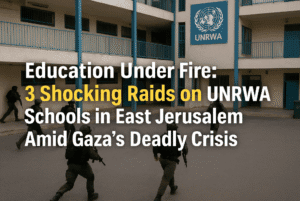Education Under Fire: 3 Shocking Raids on UNRWA Schools in East Jerusalem Amid Gaza’s Deadly Crisis
The UNRWA has condemned Israeli forces’ raids on three of its schools in East Jerusalem’s Shu’fat refugee camp, which disrupted education for over 550 Palestinian children. The incident has intensified fears of long-term damage to education and safety in the area, especially as Israel’s closure orders threaten the stability of these schools. Meanwhile, Gaza’s humanitarian situation worsens under an Israeli aid blockade, with severe water and sanitation shortages affecting thousands. The collapse of infrastructure has led to public health risks, including disease outbreaks. UN officials emphasize the urgent need for international intervention to protect education in Jerusalem and address the deteriorating conditions in Gaza.

Education Under Fire: 3 Shocking Raids on UNRWA Schools in East Jerusalem Amid Gaza’s Deadly Crisis
8 May 2025 — In a stark escalation of tensions, the UN Relief and Works Agency for Palestine Refugees (UNRWA) has denounced the forced entry of Israeli security forces into three of its schools in occupied East Jerusalem. The incident, which occurred on Thursday at Shu’fat refugee camp, disrupted classes for over 550 Palestinian children—some as young as six—as armed personnel evacuated classrooms and detained a staff member. The move follows closure orders issued in April, which UNRWA warns threatens the education and safety of an entire generation.
Violating Safe Spaces
UNRWA Commissioner-General Philippe Lazzarini condemned the raids as an “assault on education,” stressing that schools are inviolable under international law. “Storming these premises disregards the fundamental right of children to learn in safety,” he stated. The agency’s West Bank Director, Roland Friedrich, echoed concerns, warning that Israel’s actions place refugee children at “immediate risk” of losing access to education. He urged the international community to uphold UNRWA’s mandate, emphasizing the schools’ critical role in preserving stability for vulnerable communities.
All East Jerusalem UNRWA schools were evacuated following the incident, leaving families scrambling to secure alternative arrangements. The Shu’fat camp, home to 24,000 Palestinians, already faces overcrowding and limited infrastructure, exacerbating fears of long-term disruption to children’s education and mental well-being.
Gaza’s Silent Catastrophe: Water, Waste, and Survival
Meanwhile, Gaza’s humanitarian crisis deepens ten weeks into an Israeli aid blockade, with households facing dire shortages of water, food, and medicine. A recent UN survey revealed alarming trends: 90% of families report severe water scarcity, forcing many to ration supplies for drinking over hygiene. Public water infrastructure lies in ruins, with critical repairs stalled due to fuel shortages and restricted equipment access. The shutdown of Gaza’s southern desalination plant—cut off by a damaged power line—has left thousands reliant on expensive, often contaminated water from private vendors.
Sanitation systems have similarly collapsed. The UN Office for the Coordination of Humanitarian Affairs (OCHA) highlights overflowing sewage, non-functional latrines, and insect infestations in areas like Jabalia and Nazla. Overcrowded shelters, now battling rodent outbreaks, risk disease epidemics as medical services buckle under strain. “This isn’t just a crisis—it’s a countdown to disaster,” said a local health worker, describing clinics overwhelmed by diarrhea and skin infections.
A Call for Action
UN officials stress that both crises demand urgent international attention. In East Jerusalem, protecting educational spaces is pivotal to preventing further destabilization. In Gaza, restoring water and sanitation systems is key to averting a public health catastrophe. As UNRWA’s Lazzarini noted, “Denying children safety and education today fuels the crises of tomorrow.”
With humanitarian access still constrained, advocates urge global leaders to pressure Israel to permit aid deliveries and halt measures exacerbating civilian suffering. The coming weeks will test whether the international community can translate condemnation into meaningful protection for Palestinian rights—and lives.
You must be logged in to post a comment.